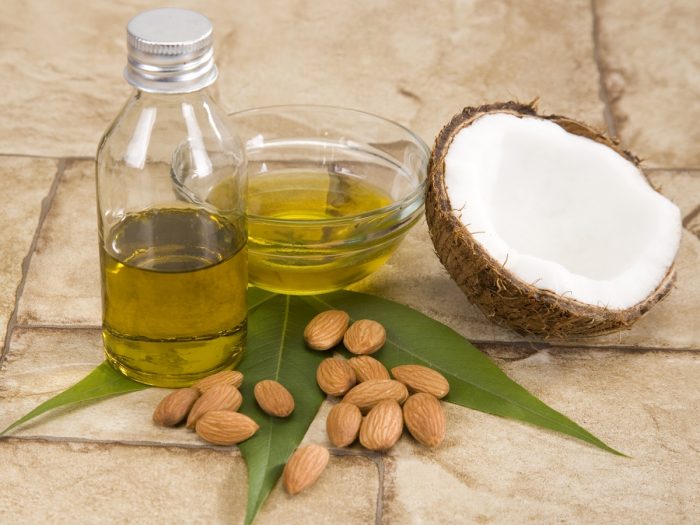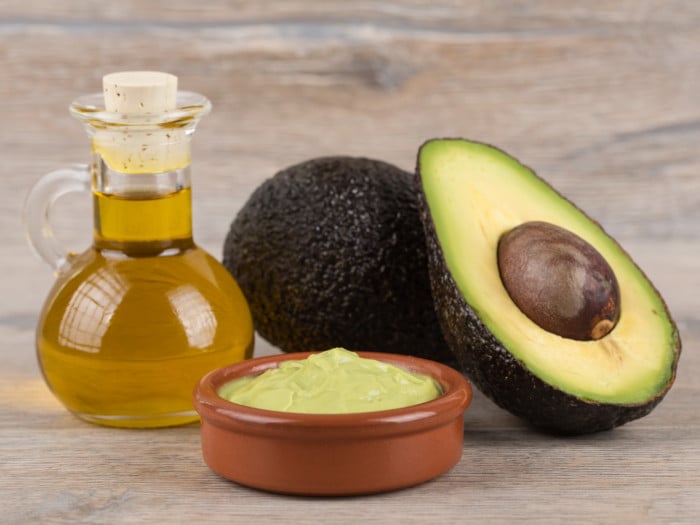The best coconut oil substitutes for baking or cooking can include olive oil, shea butter, vegetable oil, almond oil, avocado oil, neem oil, hemp seed oil, grapeseed oil, and sunflower oil.
Coconut oil is one of the most sought-after and highly prized ingredients in cooking and cosmetic products and for good reason. As per the USDA, coconut oil can be rich in beneficial fats, which can help balance your cholesterol levels. It might have natural antibacterial, anti-inflammatory, and antioxidant properties. [1]
The high levels of lauric acid, capric acid, and caprylic acid mean that this oil can boost immunity, might improve the appearance of your hair, may prevent chronic disease, and may lessen signs of aging. Clearly, there is a reason why coconut oil can be found in a vast array of hair products, skincare treatments, and healthy cooking recipes. It can be an excellent alternative to harsh or abrasive skin and hair treatments and might be healthier than butter or canola oil. [2]
However, some people may experience contact dermatitis on using this oil. Even for regular users, there may come a day when one simply runs out of one’s stock. In either case, it is good to know the best substitutes for coconut oil, as well as any different health benefits or side effects they may have on the body.

Mixing coconut & almond oils can indeed be good for your hair! Photo Credit: Shutterstock
| Serving Size : | |
|---|---|
| Nutrient | Value |
| Water [g] | 0.03 |
| Energy | 892 |
| Energy [kJ] | 3730 |
| Total lipid (fat) [g] | 99.06 |
| Ash [g] | 0.03 |
| Calcium, Ca [mg] | 1 |
| Iron, Fe [mg] | 0.05 |
| Zinc, Zn [mg] | 0.02 |
| Choline, total [mg] | 0.3 |
| Vitamin E (alpha-tocopherol) [mg] | 0.11 |
| Tocopherol, beta [mg] | 0.6 |
| Tocopherol, delta [mg] | 0.18 |
| Tocotrienol, alpha [mg] | 2.17 |
| Tocotrienol, beta [mg] | 0.13 |
| Tocotrienol, gamma [mg] | 0.36 |
| Tocotrienol, delta [mg] | 0.25 |
| Vitamin K (phylloquinone) [µg] | 0.6 |
| Fatty acids, total saturated [g] | 82.48 |
| 4:0 [g] | 0.01 |
| 6:0 [g] | 0.48 |
| 8:0 [g] | 6.8 |
| 10:0 [g] | 5.39 |
| 12:0 [g] | 41.84 |
| 14:0 [g] | 16.65 |
| 15:0 [g] | 0.02 |
| 16:0 [g] | 8.64 |
| 17:0 [g] | 0.01 |
| 18:0 [g] | 2.52 |
| 20:0 [g] | 0.08 |
| 22:0 [g] | 0.02 |
| 24:0 [g] | 0.03 |
| Fatty acids, total monounsaturated [g] | 6.33 |
| 16:1 [g] | 0.02 |
| 16:1 c [g] | 0.02 |
| 18:1 [g] | 6.27 |
| 18:1 c [g] | 6.25 |
| 20:1 [g] | 0.04 |
| Fatty acids, total polyunsaturated [g] | 1.7 |
| 18:2 [g] | 1.68 |
| 18:2 n-6 c,c [g] | 1.68 |
| 18:3 [g] | 0.02 |
| 18:3 n-3 c,c,c (ALA) [g] | 0.02 |
| Fatty acids, total trans [g] | 0.03 |
| Fatty acids, total trans-monoenoic [g] | 0.02 |
| 18:1 t [g] | 0.02 |
| 18:2 t not further defined [g] | 0.01 |
| Fatty acids, total trans-polyenoic [g] | 0.01 |
| Phytosterols [mg] | 86 |
| Sources include : USDA [3] | |
Substitutes for Coconut Oil
Let us look at the substitutes for coconut oil in detail:
Extra Virgin Olive Oil
Arguably the most popular and simplest substitute for coconut oil is extra virgin olive oil. It might be rich in antioxidants and critical minerals and is commonly used in hair care products and cosmetic supplies. It can be a natural moisturizer and might lead to reductions in dandruff and irritation on the hair and scalp, respectively, as well as a possibility of increased healing and regenerative properties for the skin.
When it comes to cooking, extra virgin olive oil can be used in the same quantities as coconut oil. While there has been some concern over the low smoking point of extra virgin olive oil, a 2018 article published in Acta Scientific Nutritional Health showed that the oil’s fatty acid profile and natural antioxidants allowed it to remain stable at high temperatures. In fact, multiple studies on Mediterranean diets, which are rich in extra virgin olive oil, show its inclusion has a host of benefits, as it might reduce the effects of aging to improving cardiovascular health. [4] [5]
Sunflower Seed Oil
Derived from sunflower seeds, this oil can be a great replacement for coconut oil, as it might be rich in vitamins A, E, and D, along with key antioxidants. The fatty acids in the oil might help lower cholesterol levels, may protect heart health, and might reduce your risk of chronic disease. The sunflower seed oil has certain carotenoids that can protect the skin from sun damage can increase the luster and appearance of your hair. It can be used in the same quantities as coconut oil in its wide range of applications. Sunflower seed oil might be rich in selenium, oleic acid, conjugated linoleic acid, and vitamin E. [6] [7] [8] [9]
It has a high smoke point of up to 230 degrees celsius, which makes it highly suitable for cooking, including deep frying.
Grapeseed Oil
This mild oil is known to be slightly astringent, making it an excellent replacement for coconut oil. It can help improve elasticity and might remove the appearance of blemishes and wrinkles, thanks to its rich antioxidant content. The range of fatty acids that it might contain, including stearic, linoleic, lauric, palmitic, oleic, and myristic acids can make it excellent for heart health. It may be a natural anti-inflammatory substance, both when consumed and when applied topically. It has a smoke point of 205 degrees Celsius, which makes it ideal for salad dressing or roasting.
Almond Oil
Slightly more expensive than other replacement options, almond oil is usually used for skin and hair care. It is easily absorbed by the skin, does not make the skin oily, and does not clog the pores. The wealth of vitamins, including A, E, B, and D might make this oil an excellent treatment for the hair. You can mix almond oil into other hair products, or simply apply it to the scalp to revitalize the skin and strengthen the hair. Its primary use, however, can be as a moisturizer, particularly on inflamed or irritated areas.
You can use unrefined almond oil in cooking. An article published in the Journal of Nutrition found that the consumption of almond oil was associated with a possibility of reduced cardiovascular risk and favorable plasma lipid profiles. However, be aware of its strong nutty flavor. It is ideally used as a finishing oil, such as in a salad dressing or to drizzle over a nutty soup. [10]
Avocado Oil
Avocado oil also makes a surprising substitute for coconut oil in cooking. It has a mild taste and a higher smoking point than extra virgin olive oil. You can use it for medium-heat cooking, such as sauteing or baking.
This vegetable oil isn’t the most common choice, but it might have a wealth of nutrients, antioxidants, vitamins, and volatile organic compounds that might moisturize the skin and may protect it from infections and irritation. Use smaller amounts than coconut oil when applying to your hair or skin. [11]

You can include avocado in any form in your diet to reap its benefits. Photo Credit: Shutterstock
Hemp Seed Oil
Although not very popular as cooking oil, hemp seed oil can be a highly suitable substitute for coconut oil. It can retain many of its beneficial properties under microwave treatment, showing that it can withstand heat. It has a low smoke point. Hence, it is best used in light cooking where you don’t use high direct heat or in baking. It is ideally used in salad dressings, to drizzle over a finished dish, or to blend in smoothies or soups. [12]
One of the most beneficial organic oils on the market, hemp seed oil might do an amazing job protecting the skin from sun damage and oxidation, might help in shrinking the size of pores, and can act as an astringent to improve elasticity and might remove signs of aging. The high levels of omega-3 fatty acids also make this a popular cooking oil for those looking to protect their heart health and avoid the use of butter or canola oil in their meal preparation. [13]
Neem Oil
Legendary in India for its health benefits, neem oil often replaces coconut oil in natural health remedies and cooking applications. This powerful oil might have antiviral and antibacterial properties and can even ward off insects when applied in cosmetic or skincare functions. It may prevent infections, might reduce the appearance of acne, might strengthen hair follicles, and may prevent hair loss. [14]
Note: It is not usually used for cooking as it is quite bitter.
Shea Butter
Shea butter is a popular ingredient in skincare products. However, it is also a thick cooking fat that might impart several benefits internally, such as a possibility of protecting against atherosclerosis and heart issues, while also soothing the stomach and promoting rapid healing throughout the body. When used as a cooking ingredient, you must check the label. It should be unrefined and not the chemically processed version that you can get easily. You can use it like any other cooking oil.
In addition to being used as a moisturizer around the world, shea butter may soothe burns, bites, eczema, psoriasis, cracked skin, and dry patches. Finally, it may provide your hair with a bright sheen and a healthy luster, and clear up split ends and unexplained hair loss. A 2018 study published in the International Journal of Molecular Sciences found that it can have anti-inflammatory and antioxidant properties. [15]
Butter
The best substitute for coconut oil in baking or cooking can be butter. While coconut oil is more prevalent in tropical countries, butter was the cooking fat of choice in many of the European cuisines. The popularity of coconut oil in baking is a comparatively recent phenomenon. Substituting with butter is easy, especially in baking. Use the same quantity as coconut oil. When cooking with direct heat, keep in mind that butter burns easily. Burnt butter or browned butter has a distinct flavor.
